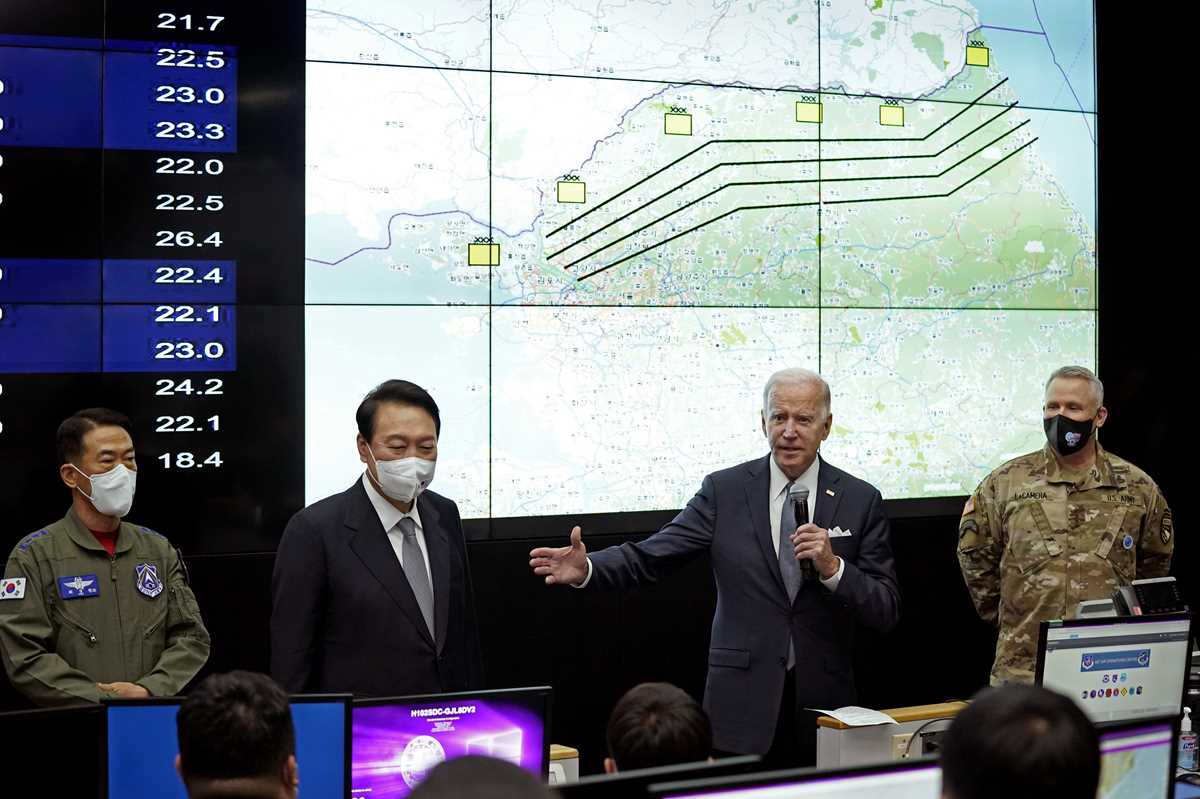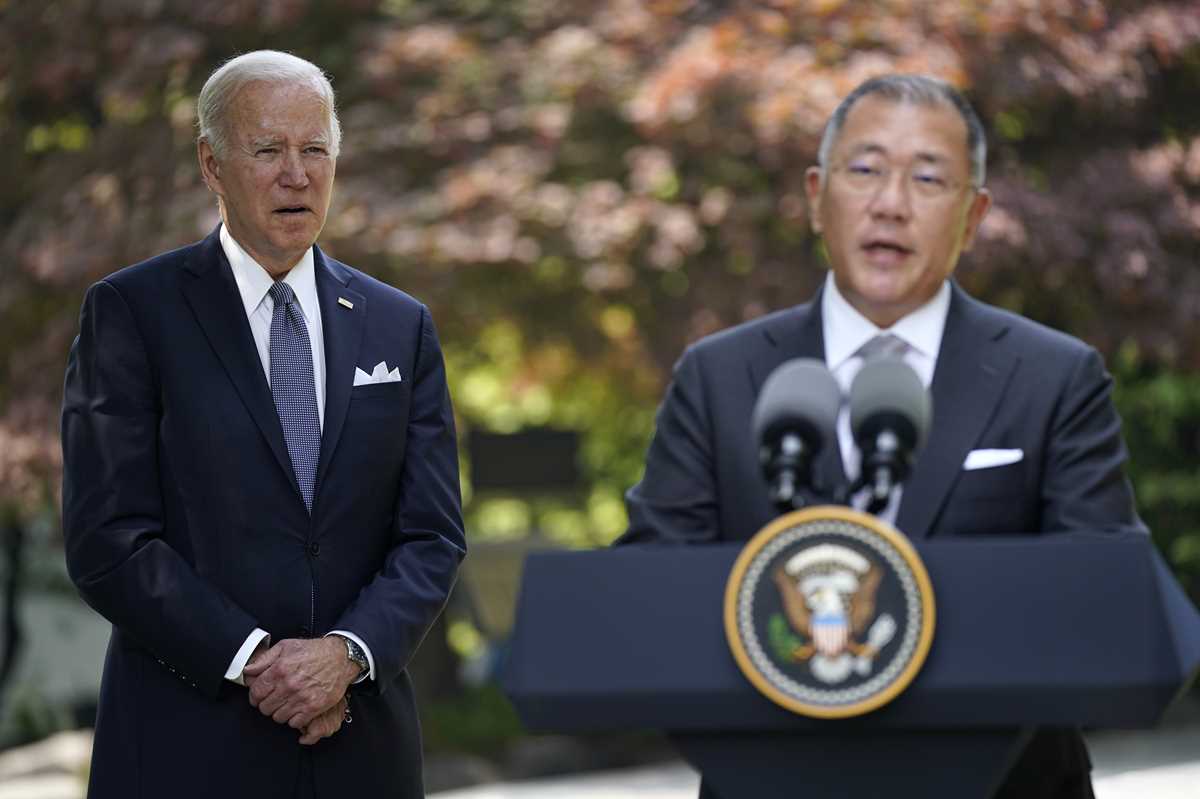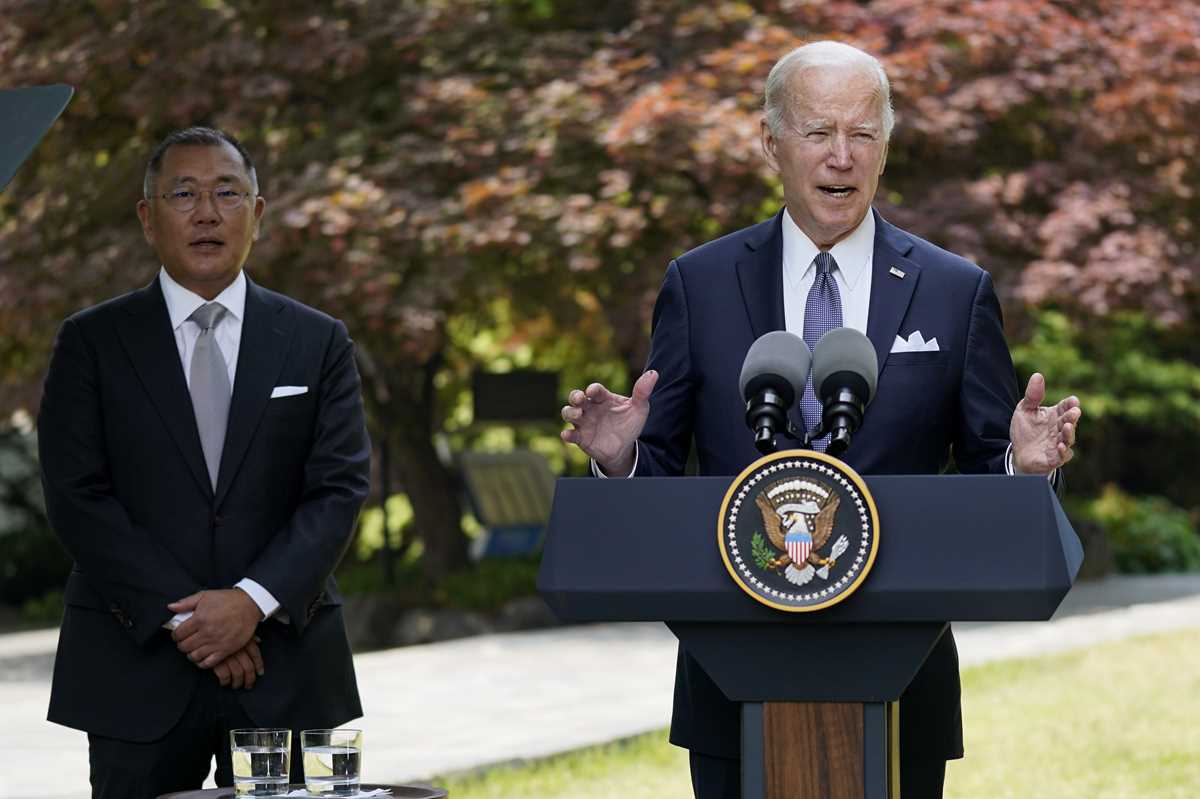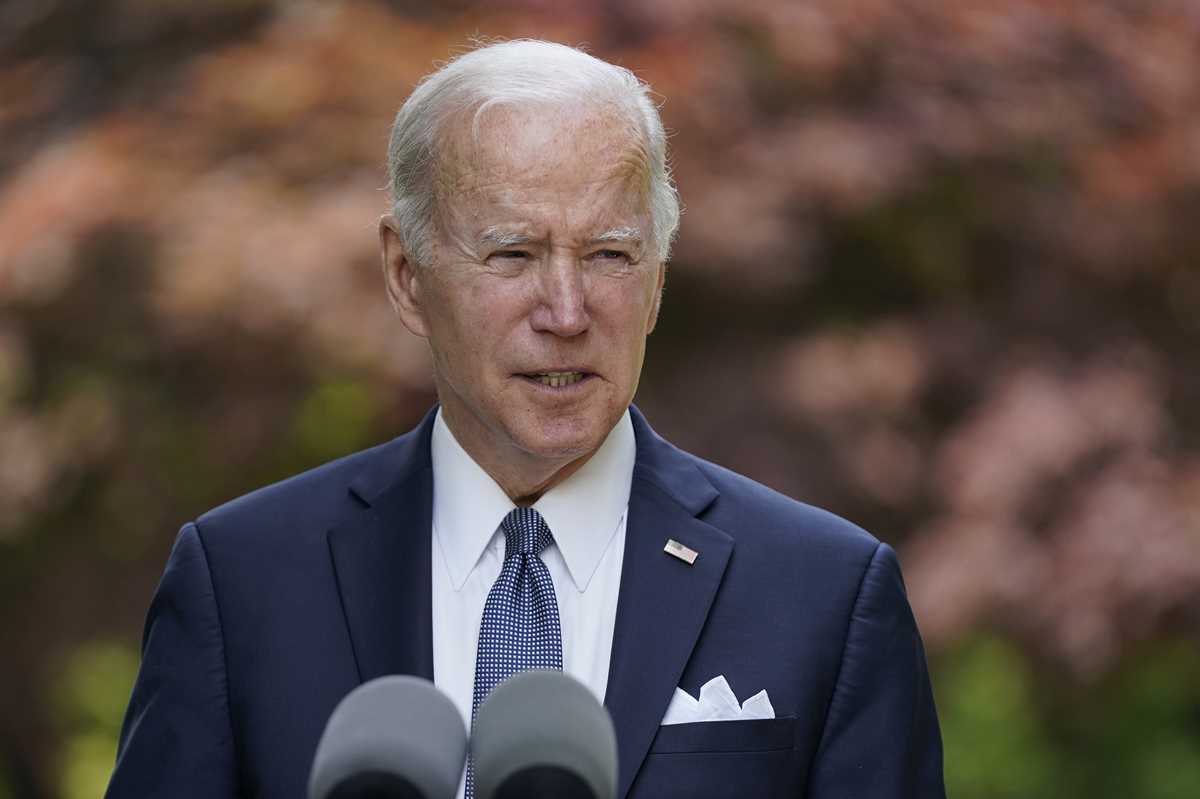 U.S. President Joe Biden delivers a speech during the state dinner hosted by South Korean President Yoon Suk Yeol at the National Museum of Korea, in Seoul, South Korea, Saturday, May 21, 2022. (AP Photo/Lee Jin-man, Pool)
U.S. President Joe Biden delivers a speech during the state dinner hosted by South Korean President Yoon Suk Yeol at the National Museum of Korea, in Seoul, South Korea, Saturday, May 21, 2022. (AP Photo/Lee Jin-man, Pool) U.S. President Joe Biden, left, listens to Hyundai Motor Group Executive Chair Euisun Chung, at the Grand Hyatt Seoul, Sunday, May 22, 2022, in Seoul. (AP Photo/Evan Vucci)
U.S. President Joe Biden, left, listens to Hyundai Motor Group Executive Chair Euisun Chung, at the Grand Hyatt Seoul, Sunday, May 22, 2022, in Seoul. (AP Photo/Evan Vucci) U.S.President Joe Biden speaks during an event with Hyundai Motor Group Executive Chair Euisun Chung, left, at the Grand Hyatt Seoul, Sunday, May 22, 2022, in Seoul. (AP Photo/Evan Vucci)
U.S.President Joe Biden speaks during an event with Hyundai Motor Group Executive Chair Euisun Chung, left, at the Grand Hyatt Seoul, Sunday, May 22, 2022, in Seoul. (AP Photo/Evan Vucci) U.S. President Joe Biden speaks during an event with Hyundai Motor Group Executive Chair Euisun Chung, at the Grand Hyatt Seoul, Sunday, May 22, 2022, in Seoul. (AP Photo/Evan Vucci)
U.S. President Joe Biden speaks during an event with Hyundai Motor Group Executive Chair Euisun Chung, at the Grand Hyatt Seoul, Sunday, May 22, 2022, in Seoul. (AP Photo/Evan Vucci) U.S. President Joe Biden, center right, with South Korean President Yoon Suk Yeol, center left, speaks at the Combat Operations Floor of the Osan Air Base, Sunday, May 22, 2022, in Pyeongtaek, South Korea. Gen. Paul J. LaCamera, U.S. Forces Korea, United Nations Command, and Combined Forces Command Commander, is at right. Lt. Gen. Sung Chun Choi, Commander, Air Force Operations Command, South Korea's Air Force is at left. (AP Photo/Evan Vucci)
U.S. President Joe Biden, center right, with South Korean President Yoon Suk Yeol, center left, speaks at the Combat Operations Floor of the Osan Air Base, Sunday, May 22, 2022, in Pyeongtaek, South Korea. Gen. Paul J. LaCamera, U.S. Forces Korea, United Nations Command, and Combined Forces Command Commander, is at right. Lt. Gen. Sung Chun Choi, Commander, Air Force Operations Command, South Korea's Air Force is at left. (AP Photo/Evan Vucci)SEOUL, South Korea (AP) — President Joe Biden tended to both business and security interests Sunday as he wrapped up a three-day visit to South Korea, showcasing Hyundai’s pledge to invest at least $10 billion in electric vehicles and related technologies in the United States.
In his final stop before heading to Japan, Biden visited Osan Air Base, where U.S. and South Korean troops monitor the rapidly evolving North Korean nuclear threat.
“You are the front line, right here in this room,” Biden said in a command center with maps of the Korean peninsula projected across screens on a wall. Afterwards, Biden ate two helpings of ice cream and chatted with troops and their dependents at the base's bowling alley.
Biden's overall visit to Asia was intended to demonstrate the U.S. commitment to the region's security. Earlier Sunday, he brushed aside questions about any possible provocation by North Korea, such as testing a nuclear weapon or missile during his trip.
“We are prepared for anything North Korea does,” he said.
Asked if he had a message for the country's leader, Kim Jong Un, Biden offered a clipped response.
“Hello,” he said. “Period.”
It was another sharp departure from his predecessor, President Donald Trump, who once said he “fell in love” with Kim.
Biden's first appearance of the day was alongside Hyundai chief executive Eusiun Chung to highlight the company's expanded investment in the United States, including $5.5 billion for an electric vehicle and battery factory in Georgia.
“Electric vehicles are good for our climate goals, but they’re also good for jobs,” Biden said. “And they’re good for business.”
Chung also said his company would spend another $5 billion on artificial intelligence for autonomous vehicles and other technologies.
The major U.S. investment by a South Korean company was a reflection of how the countries are leveraging their longstanding military ties into a broader economic partnership.
Earlier in his trip, Biden toured a computer chip plant run by Samsung, the Korean electronics giant that plans to build a $17 billion production facility in Texas.
Biden has made greater economic cooperation with South Korea a priority, saying on Saturday that “it will bring our two countries even closer together, cooperating even more closely than we already do, and help strengthen our supply chains, secure them against shocks and give our economies a competitive edge.”
The pandemic and Russia's invasion of Ukraine in February has forced a deeper rethinking of national security and economic alliances. Coronavirus outbreaks led to shortages of computer chips, autos and other goods that the Biden administration says can ultimately be fixed by having more manufacturing domestically and with trusted allies.
Hyundai's Georgia factory is expected to employ 8,100 workers and produce up to 300,000 vehicles annually, with plans for construction to begin early next year and production to start in 2025 near the unincorporated town of Ellabell.
But the Hyundai plant shows that there are also tradeoffs as Biden pursues his economic agenda.
The president has tried to link the production of electric vehicles to automakers with unionized workforces, and during his trip he called on Korean companies to hire union labor for their U.S. operations.
However, there has been no guarantee that the Hyundai Georgia plant's workers will be unionized.
Georgia is a “right-to-work” state, which means that workers may not be required to join a union or make payments to a union as a condition of employment.
A Hyundai spokesperson did not respond to an email asking if the Georgia plant would be unionized. A senior Biden administration official, who briefed reporters on the condition of anonymity, said there was no contradiction between Biden encouraging investors to embrace union workforces while his administration does “whatever it can” to encourage investment and bring jobs to the U.S.
Biden passed on visiting the demilitarized zone on the North and South’s border, a regular stop for U.S. presidents when visiting Seoul. Instead, Biden, who had visited the DMZ as vice president, was more interested in visiting Osan Air Base, said White House national security adviser Jake Sullivan.
Biden and Korean President Yoon Sook Yeol on Saturday announced they will consider expanded joint military exercises to deter the nuclear threat posed by North Korea.
The push toward deterrence by Biden and Yoon, who is less than two weeks into his presidency, marks a shift by the leaders from their predecessors. Trump had considered scrapping the exercises and expressed affection for North Korea's Kim. And the last South Korean president, Moon Jae-in, remained committed to dialogue with Kim to the end of his term despite being repeatedly rebuffed by the North.
Yoon campaigned on a promise to strengthen the U.S.-South Korea relationship. He reiterated at a dinner on Saturday in Biden's honor that it was his goal to move the relationship “beyond security” issues with North Korea, which have long dominated the relationship.
“I will try and design a new future vision of our alliances with you, Mr. President,” Yoon said.
Biden heads to Tokyo later Sunday. On Monday, he will meet with Japanese Prime Minister Fumio Kishida and lay out his vision for negotiating a new trade agreement called the Indo-Pacific Economic Framework.
A central theme for the trip, Biden’s first to Asia as president, is to tighten U.S. alliances in the Pacific to counter China’s influence in the region.
But within the Biden administration, there’s an ongoing debate about whether to lift some of the $360 billion in Trump-era tariffs on China. U.S. Treasury Secretary Janet Yellen recently said some of the tariffs are doing more harm to U.S. business and consumers than they are to China.
On Tuesday, Japan will host Biden at a summit for the Quad, a four-country strategic alliance that also includes Australia and India. The U.S. president will then return to Washington.
___
Associated Press writers Chris Megerian and Darlene Superville in Washington contributed to this report.
Before you make your next trade, you'll want to hear this.
MarketBeat keeps track of Wall Street's top-rated and best performing research analysts and the stocks they recommend to their clients on a daily basis.
Our team has identified the five stocks that top analysts are quietly whispering to their clients to buy now before the broader market catches on... and none of the big name stocks were on the list.
They believe these five stocks are the five best companies for investors to buy now...
See The Five Stocks Here
Do you expect the global demand for energy to shrink?! If not, it's time to take a look at how energy stocks can play a part in your portfolio.
Get This Free Report
